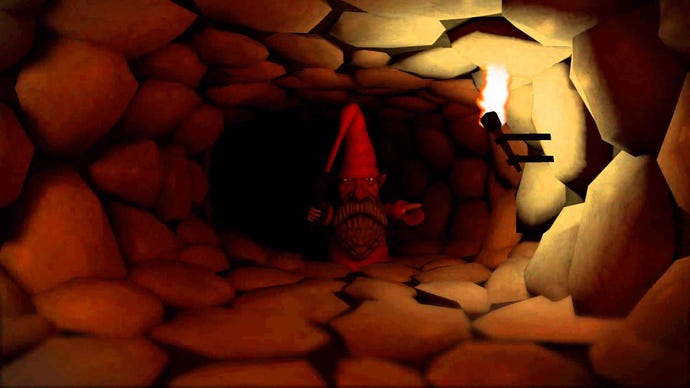Death, Death and More Death: Desktop Dungeons PC Review
When is a roguelike not a roguelike? When it's a strategic puzzle adventure citybuilding... thing.
This article first appeared on USgamer, a partner publication of VG247. Some content, such as this article, has been migrated to VG247 for posterity after USgamer's closure - but it has not been edited or further vetted by the VG247 team.
Primary Reviewer, Pete Davison
The term "roguelike" is rapidly becoming one of those descriptors that has been used so much it's lost its meaning.
In fact, I've seen a significant amount of debate on the matter on social media channels recently, with some even going so far as to suggest alternative nomenclature such as "procedural death labyrinth", which has a pleasingly defeatist ring to it.
The specific definition is arguably unimportant, though, since it's more the individual elements that make up "a roguelike" that are proving popular with a lot of gamers at the moment, rather than outright clones that follow, say, the Berlin interpretation to the letter.
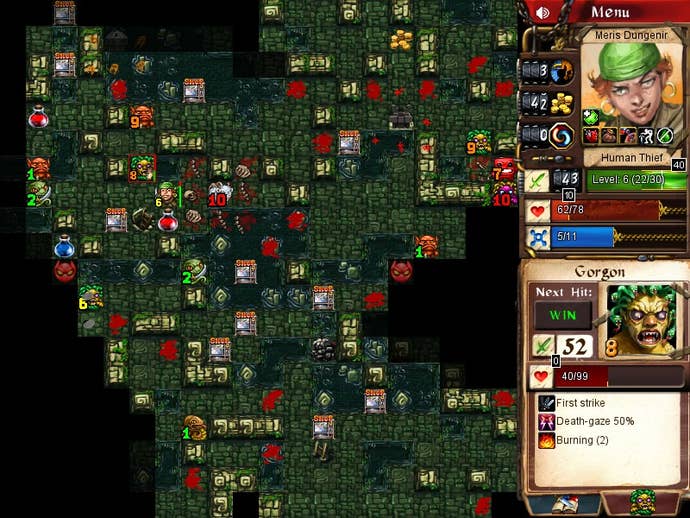
The reason I bring this up is that Desktop Dungeons, despite appearances, is not really a roguelike. It does share a lot of the conventions of the genre -- a brutal level of challenge; randomized environments; heroes that either "win" or die but regardless become unavailable after a run ends -- but its execution is rather different to what you might expect, and bears a degree of special examination, particularly with regard to its development history.
Desktop Dungeons began life a couple of years ago as a short-form dungeon crawler in which each complete run took no more than 10-15 minutes. In fact, you can still play that original version for free over at the official website, and it's a great means of determining whether or not you'll be into what the whole game offers.
Desktop Dungeons' twist on the usual dungeon crawl formula, though, is in making each dungeon more of a puzzle to solve rather than a mindless hack-and-slash. The concept of scarcity is an important consideration, since you have limited resources to work with in order to "solve" each dungeon, and it's absolutely possible to get yourself into an unwinnable situation. Easy, in fact. But that doesn't make the game frustrating; it simply forces you to play in a way you might not be accustomed to.
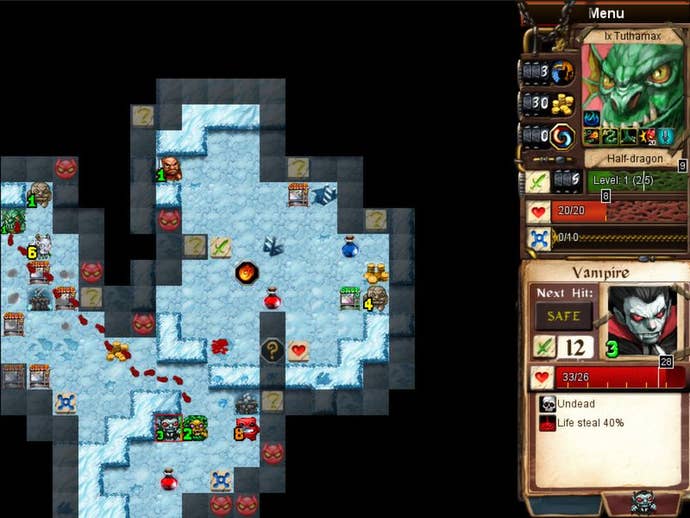
The aim of each Desktop Dungeons run is simple: kill the boss. This is the highest level monster in a dungeon, and often has special abilities. The level 1 hero you send into the dungeon won't stand a chance from the outset, so it's up to you to level them up and ensure they have enough resources on hand to defeat the boss before it defeats them. Cue exploring, bopping monsters on the head for experience, rapid levelling up and the acquisition of loot and powerups.
Here's the twist. Monsters don't move, which means they can block your path, and you only regenerate health and mana in two situations: whenever you uncover new map tiles, or whenever you level up. Consequently, making your way through the dungeon isn't necessarily a case of battering all the level 1 monsters, then the level 2s and so on; you need to maximize your experience gains while minimizing the amount of unnecessary exploration you do. By the time you reach the boss, you more often than not simply need to ensure you have enough resources on hand to win at a war of attrition, or at least to ensure that the damage you deal outstrips the damage you take. The complexity and depth comes from working your way to the boss in the most efficient way possible rather than the actual fight itself.
It's very challenging, but there are ways you can make life easier for yourself, and that's where the new elements in this standalone version come in. Unlike the original free alpha version, which simply unlocked content as you completed various challenges, the new version of Desktop Dungeons comes with a metagame attached, whereby you're constructing and upgrading buildings to give yourself access to new game features such as races, classes and items you can take into the dungeon with you. It's very simplistic -- and can, at times, detract from the rather freeform, self-contained feel of the original alpha -- but for those who enjoy a feeling of progressing rather than taking on individual challenges that aren't part of a larger puzzle, it's a nice addition and certainly doesn't hurt the game any.
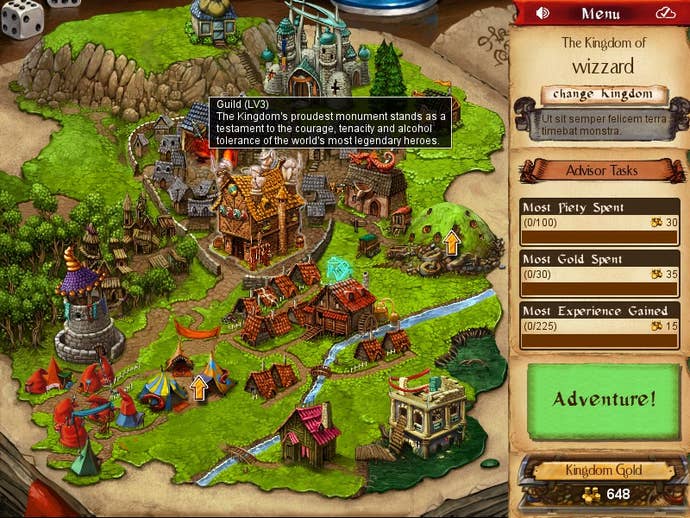
The presentation's had an overhaul since the game's original incarnation, too. While there's still very little in the way of animation, the new character and monster sprites are presented in a distinctive art style that gives them a huge amount of personality. Importantly, the presentation doesn't detract from what's important: being able to quickly and easily review the on-screen situation and plan accordingly. The way the interface works means that you'll always know the results of any action you take before you take it, and as such any catastrophic errors are always entirely your fault rather than being subject to the whim of a random number generator.
The soundtrack's worthy of mention, too. Composed by Danny Baranowsky, the composer behind Super Meat Boy and The Binding of Isaac, it's a deliberately overdramatic homage to typical fantasy soundtracks that presents an atmospheric and inspiring but unobtrusive accompaniment to the action. It can get repetitive, but it's also easily turned off if you feel strongly about it.
While Desktop Dungeons is an excellent game that presents a genuinely new twist on roguelikes procedural death labyrinths, it's hard to recommend it to absolutely everyone. The strategic thinking required to complete each dungeon can be heavy going, and it can be easy to feel like you're not making any progress in the metagame if you continually bang your head against a difficult-to-complete quest.
Fortunately, as previously mentioned, there's an easy way to determine whether or not this sort of thing is your jam: try the free alpha. While its presentation is inferior and it lacks the metagame, the basic mechanics are the same, and it includes a helpful tutorial to get you started. Give it a shot, and if you dig it, I strongly recommend picking up the full version with confidence.
Second Opinion, Cassandra Khaw
I'm exhausted. The sun is blearily inching across the horizon, turning indigo skies orange with the coming day. I haven't slept yet. There's an incriminating mug of coffee beside me. It takes me a moment to register exactly how long "just a few more minutes" really means when it comes to Desktop Dungeons. (Two hours too long, give or take. In case you were wondering.)
Desktop Dungeons is lovely. Really lovely. It's a pint-sized puzzle game authored to resemble roguelikes. There's an almost disconcerting level of brutality to this prize-winning sadist, one that deeply contrasts the game's simplistic looks and flippant sense of humor. which, incidentally, is rather well-delivered. Though the narrative is hardly the focus in Desktop Dungeons, it's certainly beautifully performed.
The bank is governed by vampires, the elves dabble in questionable medical supplies and the dwarves are shrunken frat boys. The ideas presented aren't incredibly unique but the omnipresent wit makes the silliness more than just palatable. I caught myself giggling quietly to myself more than once before the inevitable segue into sullen swearing. (Losing to some of these bosses feel like an affront to my personal skill.)
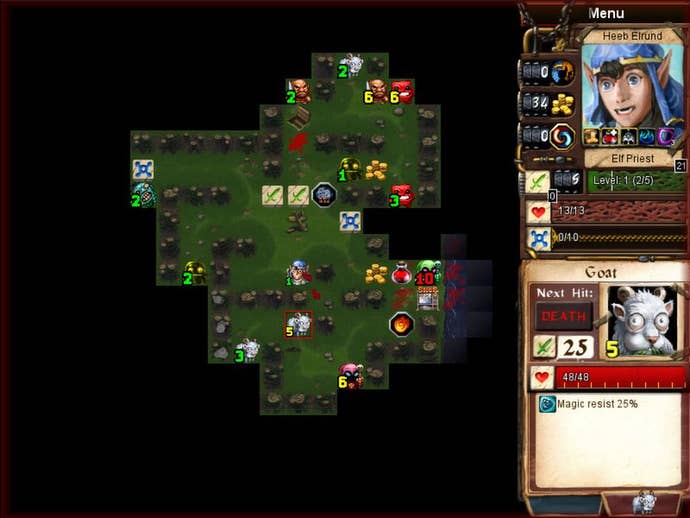
As I've intimated previously, Desktop Dungeons is deliciously hard. What I adore most about it is how it repeatedly lulls you into familiar patterns before, without so much as a pop-up message, reminding you that you're playing a different game here, chump. You enter a new dungeon and the stage opens. A level one critter is sitting brazenly within reach. You rush over. You twap him. You move to the next static enemy. Halfway through the dungeon, you slap your forehead in despair, realizing for the umpteenth time that this isn't your typical RPG and you've doomed the rest of your campaign.
It might seem weird to endorse such subtle trickery but it really is one of those things that makes Desktop Dungeons so compelling. This roguelike-lite-slash-puzzle extravaganza will constantly test your wits and do so without demanding you plunk three hours in its company. (Unless you get caught up in the moment, of course. In which case it is no longer the game's fault.)
I can't report on the overarching "meta game" that Desktop Dungeons came with just yet. It's a fun twist that niggles at my compulsive need to unlock all the features. Press releases and outside accounts suggests that there may be dozens of races and classes to introduce to your growing hamlet, something I'm eager to see if for no other reason than to giggle at their introductions.>In the meantime, I'm going to resume pitching bodies at all those randomized dungeons in the vain hope that dumb luck might be able to triumph in the absence of strategic patience. Raaawwwwwr!
The Nitty Gritty
- Visuals: The game has an extremely distinctive visual style that abandons the original alpha's pixel art in favor of heavily stylized character designs. It works well, and helps you easily see at a glance what's going on.
- Music and Sound: Danny Baranowsky's score is excellent, while the surprisingly meaty sound effects will give your subwoofer a workout.
- Interface: Exemplary. Desktop Dungeons' interface allows you to accurately plan out what you're going to do several moves in advance, meaning any strategic shortcomings are almost inevitably entirely your fault rather than that of the game.
- Lasting Appeal: This will keep you going for a long time. Even after you've unlocked everything -- which will take a hefty period of time in itself -- it's a game that's eminently friendly to dropping in for a quick playthrough.
ConclusionWhile the amount of strategic thinking required will put off those who prefer games with a little less difficulty and a little more immediacy, Desktop Dungeons is a creative, rewarding and utterly addictive game that will keep you raiding goblin lairs until the small hours.
